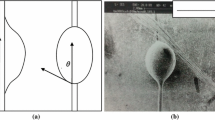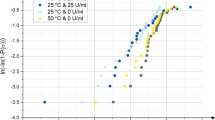Abstract
The transfer of stress between an embedded fibre and a surrounding matrix, and vice versa, is achieved either by means of a bonding mechanism which can include combinations of chemical bonding, mechanical interlock and slip mechanisms which can include friction between the matrix and the fibre. These two mechanisms can be characterized experimentally for specific fibre-matrix systems. The experimental technique most widely used for the purposes of interface characterization is the pull out test which consists of a single fibre which is embedded in a matrix (Piggot, 1980). This method of fibre-matrix interface characterization is however both time consuming and especially sensitive to the test procedure. The fragmentation test has recently been proposed as a means for studying the interface strength characteristics of composites and their influence of matrix crack development. The test which consists of a single fibre embedded within a large region of a matrix material permits not only the ease of testing but also a clearer study of extended matrix cracking at a cracked fibre region (Chamis, 1974; Busschen, 1991; Sancaktar and Ma, 1992).
Access this chapter
Tax calculation will be finalised at checkout
Purchases are for personal use only
Preview
Unable to display preview. Download preview PDF.
Similar content being viewed by others
References
Blandford, G.E., Ingraffea, A.R., and Liggett, J.A., 1981, “Two-dimensional stress intensity factor computations using the boundary element method”, Int. J. Num. Meth. Engng., Vol.17, pp.387–404.
Busschen, A. ten, 1991, Micromechanical modelling of unidirectional glass fibre reinforced polyester: Effects of matrix shrinkage, Proc. Euromech. Coll.269, (A. Vautrin, Ed.), St. Etienne, Fr., pp.1–8.
Busschen, A. ten and Selvadurai, A.P.S., 1993, Mechanics of a fragmentation test involving an embedded fibre. Part I Experimental investigations (unpublished).
Chamis, C.C., 1974, Mechanics of load transfer at the interface, Interfaces in Polymer Matrix Composites, Vol.6. (L.J. Broutman and R.H. Crock, Eds.), Academic Press, New York, pp.31–77.
Cruse, T. and Wilson, R.B., 1977, Boundary Integral Equation Method for Elastic Fracture Mechanics, AFSOR-TR-78–0355, 10–11.
Erdogan, F. and Sih, G.C., 1963, On the crack extension of plates under plane loading and transverse shear, Journal of Basic Engineering, 85, pp.519–527.
Lawn, B.R. and Wilshaw, T.R., 1975, Fracture of Brittle Solids, Cambridge University Press, Cambridge.
Liebowitz, H. (Ed.), 1968, Fracture, Vol.I-IV, Pergamon Press, Oxford.
Piggott, M.R., 1980, Load Bearing Fibre Composites, Pergamon Press, New York.
Sancaktar, E. and Ma, W., 1992, Viscoelastic and processing effects on the fibre-matrix interphase strength. Part III. The effects of postcure, J. Adhesion, 30, pp.131–151.
Selvadurai, A.P.S. and Au, M.C., 1988, “Cracks with frictional surfaces: A bound- ary element approach”, Proceedings of the 9th Boundary Element Conference, (Ed. Brebbia, C.A.), Southampton, UK, Springer-Verlag, Berlin, pp.211–230.
Selvadurai, A.P.S. and Au, M.C., 1989, “Crack behaviour associated with contact problems with non-linear interface constraints”, Boundary Element Techniques: Applications in Engineering, (Brebbia, C.A. and Zamani, N., Eds.), Proceedings of the Boundary Element Technology Conference, Windsor, Ontario, Computational Me- chanics Publ., pp. 1–17.
Selvadurai, A.P.S., 1991, Cracks at the extremities of cylindrical fibre inclusion, Proc. IUTAM Symp. Inelastic Deformation of Composite Materials, Troy, N.Y. (G.J. Dvorak, Ed.), Springer Verlag, Berlin, pp. 147–171.
Selvadurai, A.P.S. and Busschen, A. ten, 1993, Mechanics of a fragmentation test involving an embedded fibre. Part II. Computational modelling and comparisons (unpublished).
Shah, S.P. and Swartz, S.E. (Eds.), 1987, Fracture of Concrete and Rock, SEM-RILEM International Conference, Houston, Texas, Springer Verlag, Berlin.
Sih, G.C., 1973, Some basic problems in fracture mechanics and new concepts, Journal of Engineering Fracture Mechanics, 5, pp.365–377.
Sih, G.C., 1974, Strain energy density factor applied to mixed mode crack problems, International Journal of Fracture, 10, pp.305–321.
Sih, G.C., 1975, Application of the strain energy density theory to fundamental fracture problems, Recent Advances in Engineering Science (T.S. Chang, Ed.), Scientific Publ. Inc., Boston, Vol.6, pp.221–234.
Sih, G.C., 1991, Mechanics of Fracture Initiation and Propagation, Kluwer Academic Publisher, Dordrecht, The Netherlands.
Smith, R.N.L. and Mason, J.C., 1982, “A boundary element method for curved crack problems in two dimensions”, in Boundary Element Methods in Engineering, (Brebbia, C.A., Ed.), Springer-Verlag, Berlin, pp.472–484.
Author information
Authors and Affiliations
Editor information
Editors and Affiliations
Rights and permissions
Copyright information
© 1993 Springer Science+Business Media Dordrecht
About this chapter
Cite this chapter
Selvadurai, A.P.S., ten Busschen, A., Ernst, L.J. (1993). Computational Models for Fragmentation Tests. In: Dijksman, J.F., Nieuwstadt, F.T.M. (eds) Topics in Applied Mechanics. Springer, Dordrecht. https://doi.org/10.1007/978-94-011-2090-6_10
Download citation
DOI: https://doi.org/10.1007/978-94-011-2090-6_10
Publisher Name: Springer, Dordrecht
Print ISBN: 978-94-010-4926-9
Online ISBN: 978-94-011-2090-6
eBook Packages: Springer Book Archive




